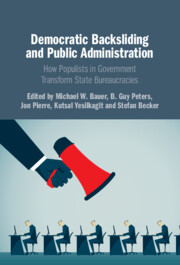 Democratic Backsliding and Public Administration
Democratic Backsliding and Public Administration Book contents
- Democratic Backsliding and Public Administration
- Democratic Backsliding and Public Administration
- Copyright page
- Contents
- Figures
- Tables
- Contributors
- Preface
- 1 Introduction: Populists, Democratic Backsliding, and Public Administration
- 2 Incomplete Democratization, System Transformation, and the Civil Service: A Case Study on the Weimar Republic and the Nazi Regime in Germany
- 3 Resilience Without Resistance: Public Administration Under Mutating Populisms in Office in Italy
- 4 Illiberal Transformation of Government Bureaucracy in a Fragile Democracy: The Case of Hungary
- 5 Public Administration in Poland in the Times of Populist Drift
- 6 Technocratic-Populist Mayors and Public Administration in Three European Cities
- 7 Populism and the Deep State: The Attack on Public Service Under Trump
- 8 “Doublespeak Populism” and Public Administration: The Case of Mexico
- 9 Venezuela: Sidelining Public Administration Under a Revolutionary-Populist Regime
- 10 Working, Shirking, and Sabotage in Times of Democratic Backsliding: An Experimental Study in Brazil
- 11 Public Administration: How to Respond to Populism and Democratic Backsliding
- 12 Conclusions: Public Administration Under the Rule of Democratic Backsliders
- References
- Index
11 - Public Administration: How to Respond to Populism and Democratic Backsliding
Published online by Cambridge University Press: 17 August 2021
- Democratic Backsliding and Public Administration
- Democratic Backsliding and Public Administration
- Copyright page
- Contents
- Figures
- Tables
- Contributors
- Preface
- 1 Introduction: Populists, Democratic Backsliding, and Public Administration
- 2 Incomplete Democratization, System Transformation, and the Civil Service: A Case Study on the Weimar Republic and the Nazi Regime in Germany
- 3 Resilience Without Resistance: Public Administration Under Mutating Populisms in Office in Italy
- 4 Illiberal Transformation of Government Bureaucracy in a Fragile Democracy: The Case of Hungary
- 5 Public Administration in Poland in the Times of Populist Drift
- 6 Technocratic-Populist Mayors and Public Administration in Three European Cities
- 7 Populism and the Deep State: The Attack on Public Service Under Trump
- 8 “Doublespeak Populism” and Public Administration: The Case of Mexico
- 9 Venezuela: Sidelining Public Administration Under a Revolutionary-Populist Regime
- 10 Working, Shirking, and Sabotage in Times of Democratic Backsliding: An Experimental Study in Brazil
- 11 Public Administration: How to Respond to Populism and Democratic Backsliding
- 12 Conclusions: Public Administration Under the Rule of Democratic Backsliders
- References
- Index
Summary
Public administration might be viewed as a potential victim of populist-inspired backsliding. This chapter argues that when considering how to respond to populism public administration needs to recognize that some of its practices may have created an opening for the populist charge. Public administration may be a victim but also may have been an unwitting harbinger of the populist surge. The public administration reforms in vogue over the last two decades helped to create the conditions for populism. Performance management, citizen consultation, and evidence-based policymaking were popular managerial tools, but the evidence presented in this chapter suggests they may have encouraged a loss of public trust due to the way they were put into practice. The threat of democratic backsliding, driven by populism, should stimulate public administration not to hunker down but to search for better ways of operating in order to rebuild public trust.There are some positive signs of new thinking and practice.
Keywords
- Type
- Chapter
- Information
- Democratic Backsliding and Public AdministrationHow Populists in Government Transform State Bureaucracies, pp. 246 - 266Publisher: Cambridge University PressPrint publication year: 2021
- 6
- Cited by


